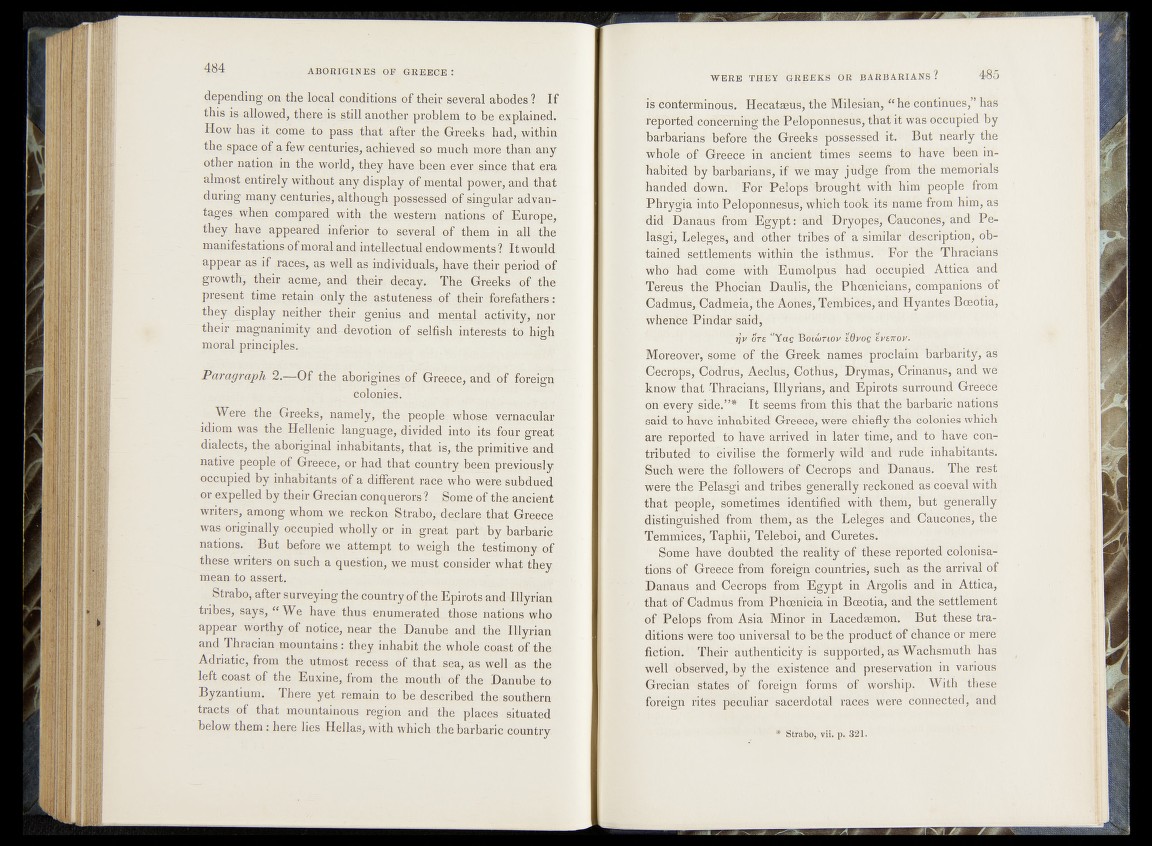
depending on- the local conditions of their several abodes ? * ,I.f
is allowed, there is still another problem to he explained.
How has it come pass that after sthe. Greeks had, \vithin
the space of a few cgnturies, achieved so much more than any
other nation in the world, they have^egii^ever since that era
almost entirely without any display of mental po,w>er, and that
during many centuries, although .ppsse.ssed of singular adv.an;-
t^esAptep compared with the western nations; ^f-lfjp’ope,
they have appeared-inferior to several of them in all the
1?^a?ii;feskati'oris o f moral andjintellectual endowments ? It would,
appeat-as if -paces, as welkas individuals, have,.their. period of
growth, their aquae, and their, decay. The Greeks .the
present time retain only the astùfgiâgsj^ of their-‘iqrefathers :
they^dfpjay neither their genius and mejit&U activity,...por
thah* Diagnanimity and-devotion of. selfish interests^ ttÇhigh
moral principles.
P aragraph 2.—-Of the aborigiri^^of JGrreeçe, and of .fprmgn,
colonies. -
I Were the .Greeks, namely, the people; whose- vernacular
idiom was the Hellenic language, .divided into ite four great
dialects, the aboriginal inhabitants,-that ,is, the^primitive and
native people of Greece, or had that~eountryAbfih#epreviously
occupied by:inhabitants of a different race who wemsuhdued
or expelled by their Grecian conquerors? .i?oipgpfi|}J&.e ancient
writers, among whom we reckon Strabo^dgclare .that Greece
was originally occupied wholly or in great parV by.barbaric
nations. But before we attempt to weigh ,the..testimony of
these writers on such a question, we must consider what they
mean to assert.
Strabo, after surveying the country of the Epirots and Illyrian
tribes,^. sayS, “ We have thus enumerated.., those pations who
appear. worthy of notice, near the Danube and the Illyrian
apd Thracian.mountains : they inhabit the whole coast of the
Adriatic, from the utmost recess o f .that, sea, as well as the
left coast o f the Euxine^from the mouth' of the Danube to
Byzantium. There yet remain to.,be,,described the,southern
tracts of that mountainous region. and : the places | situated
below them : here lies Hellas* with which the barbaric country
is conterminous. Hecatseus, the Mildsian, “ he continues,” has
reported concerning the Peloponnesus* that it was occupied by
barbarians before the Greeks possessed it. But nearly the
whole of Greece in ancient times' seems to'have been inhabited
by barbarians’, if we may judge' from the memorials
handed* down. For Pelbps'%rou^ht w7ith him people from
Phrygia into Pelopoftnesus:; which took its name from him, as
did Dana'Us from Bg^p't^and Di^'5^e^|^Ga‘ucones,"and Pe-
lalgi^Ddfeg^^nd other' tribes'of a similar 'description, obtained
settlements within the isthmus.'"For the Thracians
who had 'cdfiae with Eumolpus had* Occupied Attica and
Te’rehs tllfe ^hocian Datilis, the Phtebid^n&7 companions of
Cadiiius, Oadmeia,Jthe Aones, Tembices, and Hyantes BoeOtia,
whence Pindar ’sdfdy '
„ i j v 'o r e " Y a g B o u o t i o v id v o g e y s T r o v 1.- ' x
Moreover,^som’e" of "the Greek names proclaim barbarity, as
Geerops, Cpdr-us, Aeclu's, Cothus, Drymas, Crinanus| jlnd we
know that Tliraciansj Illyrians, and Epirotspurround Greece?
on every sidy”* It seems from this that the barbaric nations
sStH^to naVeTnhabitbef Greece, wer&'chiefly the cblonfes which
are reported t'o"have ‘arrived in latel time, and to have'coh^
tributed t<l^li^i'lisc^tfenufOf^erTy wild ‘and rude inhabitants.
Such’ were the followers of Gebrops and Danausl|§The rest
were the PeTas'gi and tribes generally rdckbried^as'coeval with
that pedjjflltf^ometimes idehtified’with theiif, but generally*
distinguished from them,'as " the LelegeS^and CauPon’ey the
Temmices, Taphii, Teleboi, and Ghrefe»/ *
■ Somd have doubtedfttlle* reality of these: reported, colonisations
of ’Grebce from foreign countries}' such’ a’s the arrival of
Danaus vand Cecrops from Egypt in Argolis and in Attica,
that of CadmusTiom Phoenicia in Boeotia, and the settlement
of' Pelops from Asia Minor in Ehdedsemoil/’ But these tfadditions
were too Universal to be the product of chance or mere4
fictiott. Their authbrftibity i§^ttipported,'ds Wachsmuth has
well observed,«by the'1 existence’ and preservation in various
Greciad'states of fofolgh1 forms'of worship. With these
foreign rites peculiar sacerdotii races were connected, and
* Strabo, vii. p. 321.